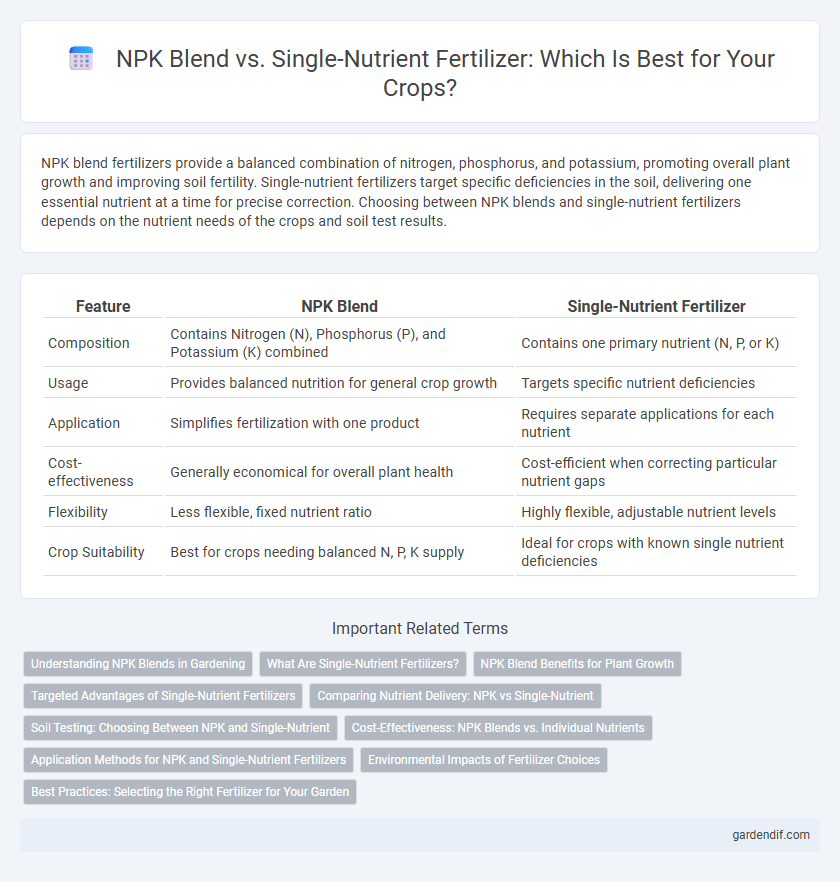
NPK blend vs Single-nutrient fertilizer Illustration
NPK blend fertilizers provide a balanced combination of nitrogen, phosphorus, and potassium, promoting overall plant growth and improving soil fertility. Single-nutrient fertilizers target specific deficiencies in the soil, delivering one essential nutrient at a time for precise correction. Choosing between NPK blends and single-nutrient fertilizers depends on the nutrient needs of the crops and soil test results.
Table of Comparison
| Feature | NPK Blend | Single-Nutrient Fertilizer |
|---|---|---|
| Composition | Contains Nitrogen (N), Phosphorus (P), and Potassium (K) combined | Contains one primary nutrient (N, P, or K) |
| Usage | Provides balanced nutrition for general crop growth | Targets specific nutrient deficiencies |
| Application | Simplifies fertilization with one product | Requires separate applications for each nutrient |
| Cost-effectiveness | Generally economical for overall plant health | Cost-efficient when correcting particular nutrient gaps |
| Flexibility | Less flexible, fixed nutrient ratio | Highly flexible, adjustable nutrient levels |
| Crop Suitability | Best for crops needing balanced N, P, K supply | Ideal for crops with known single nutrient deficiencies |
Understanding NPK Blends in Gardening
NPK blends combine nitrogen, phosphorus, and potassium in balanced ratios tailored for specific plant needs, promoting overall growth, root development, and flowering. Single-nutrient fertilizers supply only one essential element, which can be beneficial for correcting specific nutrient deficiencies but may require multiple products for comprehensive nutrition. Understanding the nutrient composition and application rates of NPK blends helps gardeners optimize soil fertility and enhance plant health efficiently.
What Are Single-Nutrient Fertilizers?
Single-nutrient fertilizers contain only one primary nutrient, such as nitrogen (N), phosphorus (P), or potassium (K), making them ideal for addressing specific soil deficiencies. Common examples include urea for nitrogen, triple superphosphate for phosphorus, and potassium chloride for potassium. These fertilizers allow precise nutrient management, enabling targeted crop optimization without the risk of nutrient imbalance often seen in blended NPK fertilizers.
NPK Blend Benefits for Plant Growth
NPK blends provide balanced nutrition by combining nitrogen (N), phosphorus (P), and potassium (K) in precise ratios tailored to plant needs, promoting healthier root development, enhanced flowering, and robust foliage growth. This comprehensive nutrient availability improves overall soil fertility and plant resilience compared to single-nutrient fertilizers that address only one deficiency. Optimized NPK formulations increase nutrient use efficiency, reduce environmental runoff, and support sustainable crop production.
Targeted Advantages of Single-Nutrient Fertilizers
Single-nutrient fertilizers provide precise control over nutrient application, allowing farmers to address specific soil deficiencies such as nitrogen, phosphorus, or potassium with accuracy. This targeted approach minimizes nutrient waste and reduces the risk of nutrient imbalances, enhancing crop yield and quality. Tailored nutrient management with single-nutrient fertilizers supports sustainable agriculture by optimizing fertilization efficiency and environmental stewardship.
Comparing Nutrient Delivery: NPK vs Single-Nutrient
NPK fertilizers provide a balanced blend of nitrogen, phosphorus, and potassium, ensuring simultaneous delivery of essential macronutrients for overall plant growth and development. Single-nutrient fertilizers supply one specific nutrient, allowing targeted correction of particular deficiencies but requiring careful management to avoid imbalances. Comparing nutrient delivery, NPK blends optimize efficiency by addressing multiple nutrient needs in one application, while single-nutrient fertilizers offer precision but may necessitate additional products for complete nutrition.
Soil Testing: Choosing Between NPK and Single-Nutrient
Soil testing provides critical data on nutrient deficiencies, guiding the choice between NPK blends and single-nutrient fertilizers for targeted fertilization. An NPK blend supplies balanced nitrogen, phosphorus, and potassium, ideal for soils needing multiple nutrient corrections. Single-nutrient fertilizers are preferable when soil tests reveal specific elemental shortages requiring precise supplementation.
Cost-Effectiveness: NPK Blends vs. Individual Nutrients
NPK blends combine nitrogen, phosphorus, and potassium in precise ratios, reducing the need for multiple purchases and lowering overall application costs compared to single-nutrient fertilizers. These blends optimize nutrient availability and uptake efficiency, enhancing crop yield while minimizing labor and transport expenses. Single-nutrient fertilizers may offer targeted correction but often incur higher cumulative costs and complicate nutrient management strategies.
Application Methods for NPK and Single-Nutrient Fertilizers
NPK blends deliver a balanced combination of nitrogen, phosphorus, and potassium in a single application, simplifying nutrient management and reducing labor costs. Single-nutrient fertilizers allow for precise control of specific nutrient levels, enabling targeted correction of soil deficiencies based on soil test results. Application methods vary with NPK blends often applied through broadcasting or fertigation, while single-nutrient fertilizers are commonly used in side-dressing or foliar feeding to meet crop-specific nutrient demands.
Environmental Impacts of Fertilizer Choices
NPK blends provide balanced nutrients, reducing the risk of over-application of individual elements and minimizing nutrient runoff that leads to water pollution. Single-nutrient fertilizers often require higher quantities, increasing the potential for soil acidification and greenhouse gas emissions like nitrous oxide. Choosing the right fertilizer type directly influences environmental sustainability by limiting nutrient leaching and preserving soil health.
Best Practices: Selecting the Right Fertilizer for Your Garden
Choosing the right fertilizer depends on soil nutrient levels and specific plant needs, where NPK blends offer a balanced supply of nitrogen, phosphorus, and potassium for general growth, while single-nutrient fertilizers target deficiencies or promote particular growth stages. Soil testing provides precise data to guide selection, preventing nutrient imbalances and optimizing plant health. Applying the correct fertilizer at recommended rates enhances nutrient uptake efficiency, reduces environmental impact, and supports sustainable gardening practices.
NPK blend vs Single-nutrient fertilizer Infographic

 gardendif.com
gardendif.com